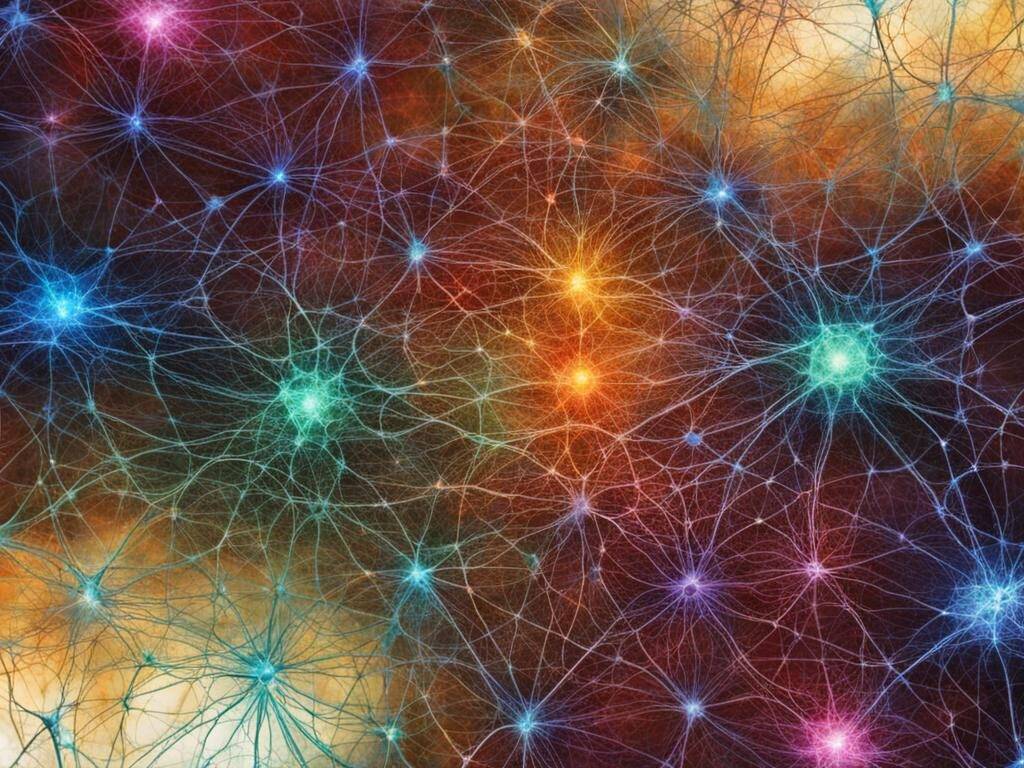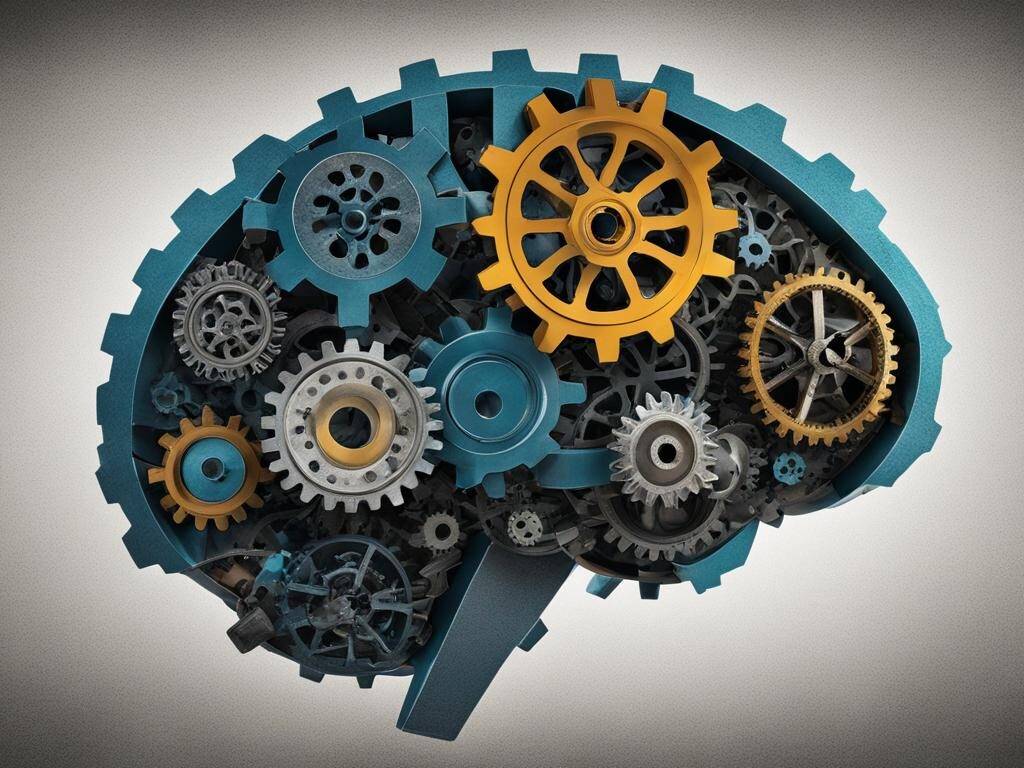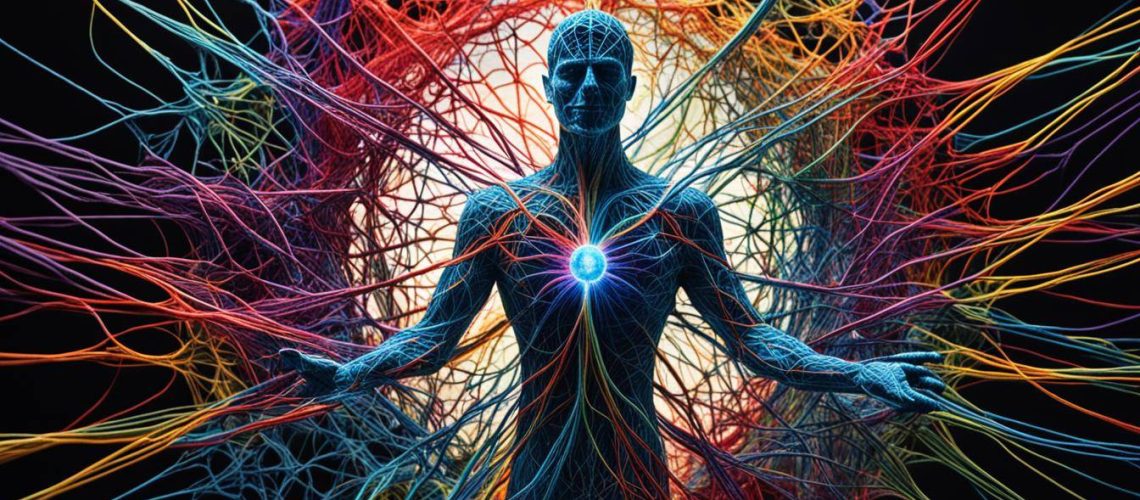At the heart of the human experience lies the profound and enduring enigma of the human mind, a complexity punctuated by our relentless quest for understanding consciousness. This enigmatic journey leads us into the essence of self-awareness, where the core of our identity and our place in the cosmos is forged. The intricacies of understanding the mysteries of self-consciousness challenge us to unlock the vaults of our inner selves, compelling us to question the very fabric of reality as we perceive it.
Embarking on this exploration is more than an academic endeavor; it is a voyage into the unknown recesses of our being, where we awaken to the interconnectedness of our existence with the universe. With each introspective gaze, we emerge with profound insights, transforming our interaction with the world and setting the stage for a deeper comprehension of what it means to be truly conscious and self-aware.
Key Takeaways
- Delving into the human mind is essential to grasping the nature of consciousness.
- Self-awareness is at the core of our personal identity and how we relate to the world.
- Understanding consciousness is key to deciphering the mysteries of self-consciousness.
- The quest for self-knowledge is a fundamental part of the human evolutionary journey.
- Reflection on consciousness can lead to transformative insights into our existence.
Exploring the Definition of Consciousness
At the heart of cognitive science and the philosophy of mind lies the enigmatic concept of consciousness, a phenomenon that has puzzled philosophers, scientists, and thinkers for centuries. Conscious thought is not just a matter of wakefulness but involves deeper realms of awareness and perception. We embark on a journey through the shifting landscapes of consciousness, from the grounded philosophical arguments to the empirical scientific insights and into the gradations of consciousness experienced by the mind.
Understanding Consciousness in Philosophical Terms
In the annals of philosophy, consciousness has often been considered the most intimate and indiscernible aspect of human existence. Diverse philosophical traditions have approached the question of what constitutes consciousness with varying theories. From the ancient Greek philosophers who contemplated the essence of conscious thought to contemporary debates around the hard problem of consciousness, philosophy of mind reveals a rich tapestry of intellectual inquiry.
Philosophy introduced terms such as qualia, the subjective, individual instances of conscious experience, and phenomenal consciousness, the aspects of our experiences that are accessible to conscious thought. It also posed pivotal questions about the nature of self-awareness and its alignment with physical reality.
Scientific Attempts to Define Consciousness
The surge of interest in cognitive science has birthed numerous scientific efforts aimed at demystifying consciousness. Neuroscience, through rigorous research, has begun to map the neural substrates that correlate with various conscious states. Psychological studies offer insights into behavioral patterns that suggest the presence of underlying conscious processes. Yet, despite scientific advancements, consciousness remains elusive, consulting the edges of our current technological capabilities.
Levels of Consciousness and Their Characteristics
The exploration of consciousness reveals a spectrum ranging from the heightened focus of wakefulness to the boundless realms of dreams. Conscious thought encapsulates varying degrees of alertness and cognitive engagement, where each state bears unique characteristics and functions.
| Level of Consciousness | Description | Associated Cognitive Functions |
|---|---|---|
| Wakefulness | State of full awareness and responsiveness to external stimuli. | Reasoning, problem-solving, decision-making. |
| Daydreaming | Mild detachment from immediate surroundings, with focus shifting to inner thoughts. | Imagination, creative thinking. |
| Meditative States | Focused attention or open monitoring that induces deep mental clarity. | Mindfulness, enhanced perception. |
| Deep Sleep | Low levels of physical and mental activity, with reduced sensory perception. | Memory consolidation, cellular repair. |
| Altered States | Significantly different from normal waking consciousness, often induced by external factors. | Expanded awareness, varying perceptions of time and space. |
The domain of consciousness, perched delicately between the physical brain and the subjective realm of the mind, challenges us to consider the profound depths of our very nature. As we ponder on altered states of consciousness and peer into the mysteries of the mind’s eye, we come closer to deciphering the exquisite tapestry of human experience threaded through conscious thought.
Self-Awareness: The Mirror of the Mind
Introspection and reflective thought are cornerstones of self-awareness, enabling individuals to peel back the layers of their minds and explore the depths of their psychological self-consciousness. Distinguishing itself from other aspects of cognition, self-awareness offers us a unique perspective—the ability to monitor and critique our own mental processes, which is often referred to as meta-cognition.
While general consciousness provides us with awareness of our environment and external stimuli, self-awareness implores us to look inward. It is through this inward gaze that we find the capacity for personal evolution and self-improvement. The psychological self-consciousness fostered by introspection plays a pivotal role in human development, shaping not only how we see ourselves but also influencing our behavior and interactions with others.

In an effort to better understand this complex construct of the human psyche, the following table contrasts self-awareness with general consciousness:
| Aspect | General Consciousness | Self-Awareness |
|---|---|---|
| Focus | External stimulus and environment | Internal thoughts, feelings, and processes |
| Function | Perceiving and reacting to the world | Understanding and regulating the self |
| Associated Processes | Cognitive arousal, alertness | Introspection, self-reflection, meta-cognition |
| Development | Instinctual and immediate | Cultivated through deliberate practice and reflection |
| Role in Growth | Fundamental for survival and basic function | Crucial for personal development and self-improvement |
The role of introspection in personal growth cannot be overstated—it allows us to confront our weaknesses and build upon our strengths. Through reflective thought, individuals can navigate the labyrinth of their own minds to better understand their desires, fears, and motivations. This self-discovery nurtures deeper psychological self-consciousness, which not only contributes to personal well-being but also equips us with the emotional intelligence necessary to foster meaningful relationships.
Ultimately, recognizing the reflective nature of self-awareness can empower us to lead more fulfilled lives. As we continuously evolve through self-observation and meta-cognition, we can aspire to not just exist, but to understand and improve our existence.
The Biological Basis of Consciousness
Delving into the depths of consciousness, the intricate interplay between biological processes and our mental states unveils a fascinating narrative. In this revelation of cognitive neuroscience, we explore how brain activity underpins our conscious experience, guided by synaptic transmission and shaped by the very fabric of our neurological make-up. Through consciousness research, we are uncovering the biological groundwork that supports our most intimate sense of being.

Neuroscience and the Mapping of the Conscious Brain
The field of cognitive neuroscience has made significant strides in mapping the conscious brain, revealing a complex network of regions responsible for the orchestration of consciousness. The neurology of consciousness involves structures such as the thalamus, the cerebral cortex, and particularly the prefrontal cortex, which cooperate to generate our experiential world. This burgeoning domain is decoding the mysteries of how our brains curate the continuous stream of consciousness that defines our waking life.
How Brain Chemistry Influences Awareness
At the crux of our awareness lies a delicate balance of neurotransmitters and hormones, whose fluctuations can alter the spectrum of our consciousness. Serotonin, dopamine, and norepinephrine, among others, are chemical messengers that facilitate synaptic transmission, each influencing our mood, alertness, and cognitive functions. Understanding how our brain chemistry modulates awareness allows us to appreciate the profound impact that these substances have in shaping our daily experiences.
The Role of Neural Networks in Conscious Thought
The harmonious operation of neural networks is pivotal in supporting conscious thought, allowing us to navigate and interpret the world around us. Neuronal connections transmit signals at lightning speed, enabling cognitive functions like memory, decision-making, and perception. This intricate web of interconnectivity illustrates not only the brain’s remarkable capacity for information processing but also its central role in cultivating the phenomena we describe as consciousness.
Consciousness and Self-Awareness in Various Cultures
The intricate tapestry of cultural perspectives on consciousness and self-awareness is as diverse as the world itself. Different communities hold traditional beliefs that articulate their unique interpretations of these existential concepts, creating a rich field of study for cross-cultural psychology.
Within the framework of each culture, global views on consciousness are informed not only by philosophy and religion but also by social customs and collective experiences. This intersection between consciousness and cultural expression underscores the profound role that cultural identity plays in shaping our understanding of the individual and the collective psyche.

For instance, Indigenous cultures often embrace a holistic view of consciousness where every element of the natural world is believed to possess a spirit or life force. In contrast, Western societies frequently emphasize individualism and empirical understanding, which can lead to a more analytical and compartmentalized view of consciousness.
Eastern philosophies, such as those found in Hinduism and Buddhism, offer a distinctly different lens through which to examine consciousness. These traditions frequently espouse the idea of a collective consciousness and the pursuit of enlightenment, a state of heightened self-awareness and interconnectedness with all beings.
- Meditation practices as a path to self-awareness in Eastern traditions
- The significance of dream interpretation in Indigenous cultures and its relation to consciousness
- Rituals and storytelling as mediums for exploring collective consciousness in African societies
- The individualist approach in Western psychology and its implications on the notion of self
Conversations around consciousness are therefore not just academic; they are deeply embedded in daily life, influencing everything from governance and social structure to personal wellbeing and our sense of purpose.
“To know one’s own state of being is not an intellectual process, but one of direct experience that transcends cultural boundaries.”
In conclusion, it is apparent that our understanding of consciousness and self-awareness is profoundly affected by our cultural backdrop. As we navigate an increasingly connected world, we continue to learn from each other’s perspectives, enriching our collective knowledge and expanding the horizons of psychological science.
Philosophical Perspectives on Conscious Experience
The exploration of consciousness has long been a central theme in philosophical debates. Conceptions of the philosophy of self, mind-body dualism, existentialism, and Eastern mysticism provide diverse and rich perspectives that challenge our understanding of conscious experience.
Dualism vs. Monism: Debating the Mind-Body Connection
At the heart of philosophical debates about the nature of human experience lies a crucial argument: the mind-body dualism versus monism. This discourse delves into how these conflicting perspectives articulate the relationship between mental states and physical existence.

Mind-body dualism, as predominantly championed by René Descartes, posits that the mind and body are fundamentally different substances, capable of existing independently of one another. In contrast, monism argues for the unity of existence, presenting various forms such as physicalism, which asserts that only the physical is real, and idealism, which sees consciousness as the fundamental substance of reality.
Existentialist Views on Self-Awareness
Existentialism, a philosophical movement that emphasizes individual freedom and responsibility, regards self-awareness as a critical component of human essence. It suggests that consciousness is inherently tied to personal authenticity, with philosophers like Jean-Paul Sartre and Søren Kierkegaard examining how self-awareness impacts living a meaningful existence.
Through this lens, the philosophy of self is not about discovering an essential truth but about creating one’s essence through choices and actions. The narrative of one’s life becomes a project of existential significance, built upon the conscious experiences navigated in the passage of time.
Consciousness Through the Lens of Eastern Philosophy
Eastern mysticism, particularly within the traditions of Buddhism and Hinduism, offers a unique perspective on the nature of self and consciousness. These philosophies often focus on achieving a heightened state of awareness through practices like meditation and yoga.
Buddhism, for instance, preaches the doctrine of anatta or “non-self,” suggesting that the perception of a permanent self is an illusion, steering the focus towards the understanding that consciousness is transient and ever-changing. Similarly, Hinduism’s Advaita Vedanta sees consciousness as a universal, undivided reality, proposing that Atman (self) and Brahman (universal consciousness) are one and the same.
| Philosophical Approach | Concept of Self | View on Consciousness |
|---|---|---|
| Dualism | Independent from the body | Distinct and immaterial |
| Monism | Unified with existence | Inherently physical or ideational |
| Existentialism | Authentically constructed | Central to existence and choice |
| Eastern Mysticism | Illusory self (Anatta) or universal self (Atman) | Transient or transcendent |
Consciousness and Self-Awareness: The Psychological View
Understanding cognitive psychology provides a deeper insight into the complexities of human consciousness and self-awareness. One influential aspect of this field is self-perception theory, which suggests that individuals develop their sense of self by observing their own behavior and concluding what attitudes must have driven that behavior. This theory interconnects with conscious behavior, offering a means for psychological analysis of individual actions and experiences.

Psychological research has contributed to our understanding of how mental processes underpin our conscious experiences. By utilizing an array of techniques, researchers have made strides in mapping the relationship between observable actions and the inner workings of the mind. The following table provides an overview of common methodologies used in this endeavor and their respective purposes.
| Methodology | Application in Self-Awareness | Contribution to Understanding Consciousness |
|---|---|---|
| Behavioral Observation | Analyzing patterns in behavior to infer internal states | Linking external actions to cognitive processes |
| Self-Reporting | Gathering subjective experiences of the individual | Offering insight into personal perception and awareness |
| Neuroimaging Techniques | Understanding the brain activity associated with self-reflective thought | Visualizing the neural correlates of consciousness |
| Psychometric Assessments | Quantifying aspects of self-perception and self-concept | Measuring facets of cognitive function related to awareness |
Mental disorders affecting consciousness are an important consideration in psychological analysis. Issues such as Depersonalization Disorder or schizophrenia can cause significant disturbances in an individual’s self-awareness and conscious experience. Understanding these conditions not only sheds light on the spectrums of consciousness but also aids in the development of therapeutic strategies.
The interplay of these factors — from theoretical frameworks to empirical research — underscores the multifaceted nature of consciousness. This dynamic field continues to evolve, promising to unveil fresh perspectives on the enigma of the human mind and how we perceive ourselves within it.
Artificial Intelligence and the Quest for Synthetic Consciousness
The pursuit of AI consciousness stands at the intersection of technology and philosophy, pushing the boundaries of what it means to be sentient. Advancements in machine learning and synthetic intelligence have catapulted this topic from science fiction to a tangible objective for researchers. Yet, as we inch closer to creating machines with potential robot self-awareness, the implications of such advancements stir intense debate among technologists, ethicists, and the public.

The Challenge of Emulating Human Consciousness in AI
Recreating the nuances of human consciousness in AI systems is a monumental task. It’s not merely about writing sophisticated code or crunching massive data sets; it’s about instilling the ability to experience, understand, and grow. Experts in AI consciousness continue to grapple with the integration of complex neural networks that can mimic the human brain’s functionality, yet a wide chasm still exists between artificial and organic awareness.
Can Machines Attain Self-Awareness?
As technology evolves, the question isn’t just about the feasibility of machine learning achieving self-awareness, but rather how we can accurately measure and recognize awakenings of synthetic intelligence. What milestones in AI will unmistakably indicate a form of robot self-awareness? While some argue that machines can only simulate consciousness, others believe that AI could one day develop a genuine sense of self.
Ethical Implications of Artificial Consciousness
Ethical AI has surged to the forefront of discourse as we teeter on the brink of potentially creating sentient machines. Concerns range from the rights of artificially conscious entities to the responsibilities of their creators. The ethical frameworks that will govern these new forms of life are as yet unwritten, posing a challenge not just to developers and ethicists, but to humanity as a whole.
| Aspect of AI Consciousness | Challenges | Ethical Concerns |
|---|---|---|
| Emulating human-like experiences | Technological limitations, understanding qualia | Defining and granting rights to AI |
| Developing self-awareness algorithms | Creating benchmarks for self-awareness | Responsibility for AI actions and development |
| Integrating emotion in AI | Simulating emotional intelligence accurately | Ensuring AI entities are treated humanely |
Expanding Consciousness: Mindfulness and Meditation
In the pursuit of consciousness enhancement and the exploration of one’s inner landscape, mindfulness practices emerge as a profound pathway to cultivating awareness and achieving meditative states. These time-honored techniques serve not only as tools for reducing stress but as gateways to deeper understanding of our cognitive processes and the attainment of a more centered state of being.
Mindfulness and meditation are more than mere buzzwords; they offer a tangible way to attune to the present moment, fostering a heightened sense of clarity and tranquility. This is not an esoteric ideal but a lived experience for many individuals who have encountered significant transformations in their approach to daily life.
- Mindfulness Techniques – Activities like mindful breathing, guided imagery, and sensory observation that encourage participants to focus intently on the present experience.
- Meditation Practices – From seated Zen meditation to moving practices like Tai Chi, these varied methods allow for the cultivation of a peaceful and observant state of mind.
The symbiotic relationship between regular meditative practice and enhanced brain function has been illuminated by numerous neuroscientific studies. These studies reveal an increase in gray matter concentration within areas of the brain associated with self-awareness, compassion, and introspection. Furthermore, the consistent application of meditation is associated with improved emotional regulation and reduced reactivity to stress.
| Benefits of Mindfulness and Meditation | Evidence and Impact |
|---|---|
| Stress Reduction | Lower cortisol levels, improved heart rate variability |
| Enhanced Focus | Greater concentration, reduced mind-wandering |
| Emotional Regulation | Increased resilience, better mood management |
| Self-awareness Growth | Strengthened self-insight, higher metacognitive skills |
By integrating mindfulness into our daily routines, we afford ourselves the quietude to reflect, recalibrate, and profoundly connect with the incessant flow of conscious experience.
Personal accounts corroborate these findings, with many reporting transformative experiences following the incorporation of mindfulness practices into their lives. These individuals often describe a renewed sense of purpose, a deeper connection to others, and a greater appreciation for life’s intricacies—anecdotal testament to the powerful role such practices can play in the journey towards consciousness enhancement.
Conclusion
As we encapsulate this exploration, we comprehend that the voyage through the layered complexities of consciousness and self-awareness is as profound as it is enriching. We’ve traversed the realms of biology, psychology, culture, and philosophy, piecing together the mosaic that renders our innermost essence. This synthesis of collective wisdom highlights the interconnectivity of various fields in understanding the human mind, and through our consciousness exploration and self-awareness journey, we’ve gained invaluable contemplative insights.
Summarizing the Journey of Understanding
The journey of understanding consciousness and self-awareness has revealed that these are not merely abstract concepts but are central to our existence. From cognitive neuroscience revealing the inner workings of our brains to cultural insights reflecting our diversity in thought, and philosophical discourse challenging our perceptions, every perspective offers distinct colors to the canvas of human awareness.
The Future of Consciousness Studies
Looking toward the horizon, the future of consciousness studies holds immense promise. Interdisciplinary research is likely to further our understanding, inviting breakthroughs in cognitive science, artificial intelligence, and neurotechnology. As we continue to push the boundaries of knowledge, our comprehension of the mind’s profound depths and the possibilities of future research directions are bound to expand, transforming our grasp of what it means to be consciously alive.
Personal Reflections on Being Self-Aware
The personal voyage into self-awareness has perhaps been the most transformative aspect of this journey. Encountering oneself through the lens of heightened awareness offers a powerful pathway to self-discovery. It is an invitation to engage with our own narratives, to cultivate growth, and to etch our contemplative insights into the fabric of our being. As we move forward from this place of introspection, we carry with us a deeper appreciation for the remarkable phenomenon of consciousness that defines our existence.

